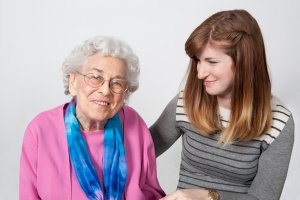There is an array of support services that can help you live independently at home. The following is a comprehensive list with explanations of each service, but we are also here to help. Let us help you find the right package of services for you. A Springwell Care Manager can visit you in your home to help you assess your needs and plan for the most cost-effective care. We will also help you determine if you are eligible for services from a variety of State and Federal programs offering support to seniors and to those coping with chronic health issues.
Read More about In-Home Services
Adaptive Housing Services
Adaptive housing services are services related to the provision of minor housing adaptations, minor home modifications, or adaptive equipment for individuals who require this service in order to remain safe and independent in the community.
Adult Day Health
Adult Day Health provides an organized program of health care and supervision, restorative services, and socialization for individuals who require skilled nursing or therapy, or assistance with activities of daily living. Nutrition and personal care services are also provided.
Aide Assisted Transportation
Alzheimer’s/Dementia Coaching
Behavioral Health Services
Behavioral Health Services provide mental health services to individuals.
Certified Older Adult Peer Specialists (COAPS)
COAPS are peer specialists, age 50+, who use existing experience, skills and training to work with older adults living with behavioral health challenges.
Chore Services
Chore services are activities related to correcting or preventing environmental defects that may be hazardous to an individual’s health and safety.
Heavy Chore includes moving furniture to vacuum, washing floors and walls, defrosting freezers, cleaning ovens, cleaning attics and basements to remove fire and health hazards, changing storm windows, yard work, and snow shoveling.
Companion Services
Companion Services assist individuals with socialization, recreation, assistance with the preparation of light snacks, shopping and errands.
Complex Care Training and Oversight
Complex Care Training and Oversight (formerly Skilled Nursing) is a periodic, episodic service that includes Medication Management (e.g., filling medication cassettes, etc.) as well as development and ongoing management and evaluation of the consumer’s Home Health Aide Plan of Care.
Dementia Day Care
Electronic Comfort Pets
Evidence Based Education Programs
Family Caregiver Support Program
Goal Engagement
Grocery Shopping
Home-based Wandering Response Systems
Home Delivered Meals
Home Delivery of Pre-Packaged Medications
Home Health Services
Home Health Services include personal care; medication reminders (medications cannot be administered); and routine care of prosthetic and orthotic devices. These services are provided by Certified Home Health Agencies (CHHA) under the supervision of an RN.
Home Safety-Independence Evaluation
Homemaker Services
Homemaker services include assistance with shopping, menu planning, meal preparation, laundry, and light housekeeping including vacuuming, dusting, dry mopping, dish washing, cleaning the kitchen and bathroom, and changing beds.
Information and Referral
Laundry Services
Laundry services include pick-up, washing, drying, folding, wrapping and returning of laundry.
Medication Dispensing System
A Medication Dispensing System is an automated medication dispenser that dispenses pill form medications at appropriate intervals through audible/visual cueing. This system organizes a pre-filled supply of pills and is programmed to deliver the correct dosage of medications when appropriate.
Money Management
Nutritional Assessment
Personal Care Service
Personal Care service includes assistance, cueing and/or supervision with bathing, dressing, shampoo/hair combing, foot care (excluding nail cutting), denture care, shaving (with electric razor), bedpan routines, eating, ambulation and transfers. The following is a partial list of activities that a personal care worker is not allowed to participate in: administration of medication and/or oxygen, participation in any aspect of automated medication dispensing systems, tube feedings, syringe feedings and the feeding of individuals who have a history of choking and/or swallowing difficulties, application of prescription creams and lotions, application of hot packs, hot water bottles, heating pads and cold packs, use of “Hoyer type” lifts and participation in a two-person carry of a totally dependent individual, participation in passive range of motion exercises.
Personal Emergency Response System (PERS)
- PERS is an electronic device connected to an individual’s telephone line. In an emergency, it can be activated either by pushing a small button on a pendant or bracelet, pressing the help button on the console unit, or by an adaptive switch set-up. When the device is activated, a person from the 24-hour-a-day, 7 days a week central monitoring station answers the call, speaks to the individual via the console unit, assesses the need for help, and takes appropriate action.
- Enhanced PERS is a service that combines the basic elements of PERS, with the capacity to program a PERS console unit so that messages from family members or friends may be pre-recorded from a remote location and transmitted to the individual at established intervals.
Respite Care
Respite Care services may be provided to relieve caregivers from the daily stresses and demands of caring for an individual.
Supportive Day Care
Supportive Home Care Aide
Supportive Home Care Aide services are for individuals who have cognitive impairments or other difficulties receiving in-home assistance. Services include assistance with bathing, dressing, shampoo/hair combing, foot care (excluding nail cutting), denture care, shaving, bedpan routines, eating, ambulating and transfers, emotional support, socialization and escorts.
Transitional Assistance
Transportation Services
Transportation Services transport individuals to and from medical appointments.
Virtual Communication and Monitoring
Vision Rehabilitation
Vision Rehabilitation is a service designed to instruct people who are visually impaired in the use of compensatory skills and aids that will enable them to live safely, productively, independently and up to their maximum potential. The training enhances personal management skills, communication skills, travel skills, low vision utilization and home management skills.


